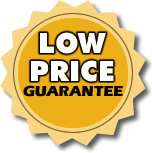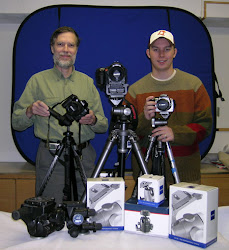Photographic Lenses - A perspective from an avid shutterbug
Have you ever wondered why photographs turn out different than what you saw through the viewfinder? Why is my photography blurry or out of focus? How do I capture more of the subject area in the photo? How can I get closer to the subject? Why is the photograph darker than suspected? I have had these questions over the years and have studied photography lenses so that I can select the most appropriate camera and camera lens for my subjects.
Today, with the most wonderful world of photography , and the technology at hand, it is much easier to shoot those prize photos even for the weekend shutterbug. But, if you understand even a few basics your photographs can turn out much better than you anticipated. It has become really easy for anyone to pick up a point and shoot fixed lens digital camera and take a great photo. With the influx of many high end, high megapixel cameras available for under $200.00, anybody can put memories in their pocket.
I started out shooting photography and using several types of photography lenses in the early 1980's. My uncle introduced me to Pentax SLR equipment as he had a wholesale representative contact in Denver. I was able to purchase thousands of dollars worth of equipment for pennies on the dollar. And, so began the journey with my Pentax LX professional line of equipment. My photography lens arsenal was made up of many types such as wide angle, zoom, telephoto, macro, and standard camera lenses . I had a motor drive, high end camera flash, tripods, camera lens filters, lens hoods and more to get me started. As an athlete my first love was shooting sports which involved fast film, fast lenses, and a zoom lens. I soon fell into shooting landscapes, wildlife, and weddings. And, let me say, all for free. I loved taking pictures and giving them away to people who did not understand how to capture those prize memorable moments behind the lens.
So, what makes up the chemistry of photography lenses? How do they work and when should I use one over the other? Today it is so easy to get that all automatic digital SLR camera and lens and hope that the subject turns out as you thought it should. I think these automatic cameras are great. However, if you understand how to utilize other photography lenses in a manual mode you can still produce beautiful photographs. I actually have a Nikon D70 digital SLR camera today in addition to my Pentax LX and Nikon Coolpix pocket digital.
Photography Lenses Explained
Camera Lens Types:
Wide Angle
The wide angle camera lens enables the photographer to shoot a photograph when you wish to encompass more of the subject scene than would be possible with a standard lens such as a 50mm focal length. Wide angle camera lenses are typically a shorter focal length under 50mm and allow the photographer to change the perspective of the scene. A moderate focal length is about 24mm to 35mm that have apertures of F/2 or F/2.8 which allows more light in. There are also extreme wide angle lenses , called fisheyes, that can produce almost a 180 degree photo. These photographic camera lenses can be fun however, make sure you understand that the lens may produce a rounded image and the depth of field can be limited in low lighting conditions.
Standard
Standard lenses are typically the 50mm lenses. These are a fixed focal length and are the lens of choice on most SLR cameras . Everyone should have this camera lens . It typically will be used the most for everyday common photography. The 50mm standard lens is about what the human eye can see in the field of vision. It also produces the most relative size of the subjects and objects in the photograph. This camera lens can be one of the fastest lenses in your camera bag. It can be purchased with a low aperture of F/1.4 which will allow for very low lighting photographic opportunities.
Zoom
The zoom lens is my favorite lens. This camera lens gives the photographer so many options especially if you are not carrying two camera bodies with you. The zoom camera lens is not limited to one focal length but has movable elements in the lens that allow for multiple ranges. Zoom photographic lenses are available in many sizes but the typical lengths give you anywhere from 35mm - 70mm and 80mm - 200mm. I recommend these two lengths for the weekend hobbyist so that a full range from 35mm - 200mm can be achieved. These lenses can be expensive especially if the aperture is under F/4.0. They are typically not used in low lighting conditions or with motion photography unless you are shooting in daylight with sunny conditions. For most photography hobbyists, the 80mm - 200mm works great for sideline photographs and has enough focal length to capture images such as wildlife from a distance.
Telephoto
Telephoto camera lenses have a focal length that is longer than a normal 50mm lens. The longer the length of the telephoto camera lens the more magnification you can get and the closer you can draw near to your subject. These camera lenses differ from the zoom in that they are fixed and cannot provide the photographer a range of lengths. Most telephotos are used where the subject is static and situations where you are restricted to keeping your distance. They usually come with a smaller aperture somewhere around F/4.0. Careful selection and use must be made when using these lenses as they can be heavier and blur photographs with the slightest movement. I would recommend a tripod or monopod for use with lenses longer than 200mm. They are absolutely great for sports and wildlife photography. I have used anywhere from 100mm to a 500mm mirror telephoto. The 500mm mirror lens was really nice when shooting at an air show.
Specialty
There a couple of specialty camera lenses that I'll talk about. The first photographic lens that is a must for close- up photography is the macro lens. This lens can come in a few focal lengths that are typically less than 100mm. The macro camera lens enables the photographer the ability to shoot subjects extremely close-up such as flowers, insects, and commercial products. These camera lenses are really fun and can produce beautiful images that fill the frame with wonderful color and detail. I have done a lot of macro photography and recommend that a tripod be used when shooting these subjects so that blurring is limited. These lenses can also have lower apertures so that long exposure under low lighting can be accomplished. The other type of specialty lens is the perspective control lenses that will take close up photographs and keep the subject sharp in focus and prevent the depth of field from distorting the subject. I have not used these types of lenses so I cannot give you a real life example. However, for most non-professional photographers this lens may not be worth the investment. Finally, I will mention the 2x converter. This photography lens cannot stand alone but augment another lens by boosting the focal length by two times it's standard length. You simply add it between the camera and your lens of choice and the optical mirrors magnify the image by two. I use this often outdoors shooting sports on sunny days where I have a bunch of light. This will boost my 300mm zoom to 600mm. And, I can get really close to my subjects from the sidelines.
Photography lenses today provides the shutterbug an array of opportunities for photographic design. Depending on the type of photographer you are, it will determine the types of camera lenses you put into your camera bag. I would suggest that everyone has at least a mid-range zoom. If it is the only lens in the your budget at time of purchase, you can add other camera lenses later. The 35mm - 70mm would be my recommendation. If you are going to shoot athletics you will most likely be on the sidelines or in the bleachers and will need up to a 300mm telephoto or zoom. Depending on your budget I would suggest a lower aperture but nothing more than F/4.0.
Have fun and remember that you can take oodles of pictures today and test your photographs much easier with digital SLR photography . If you don't like your results, delete them. Then, go out and take more pictures!
To your photographic success.
Related : Cheap Clothing Optional Galleries Store







0 comments:
Post a Comment